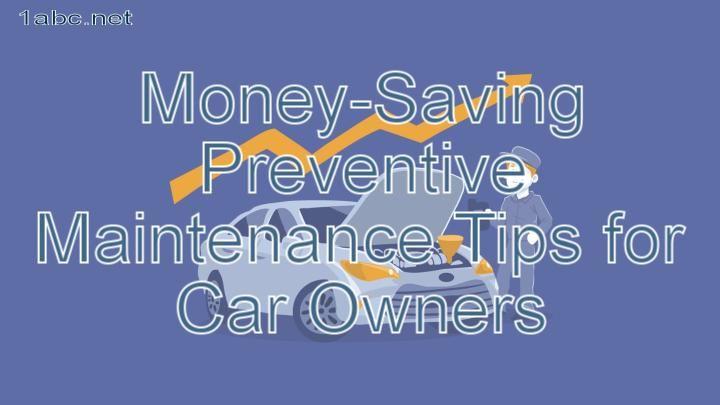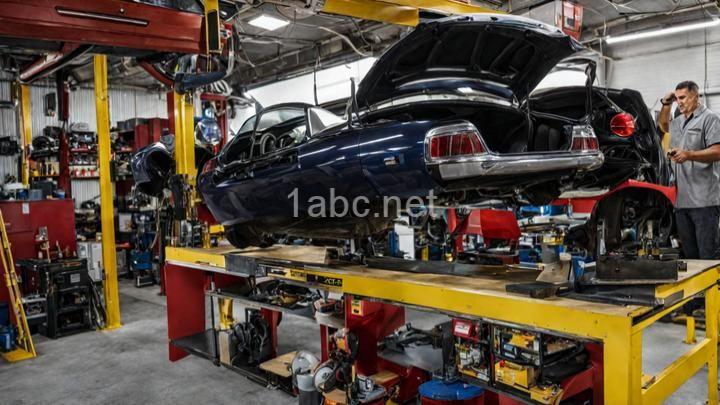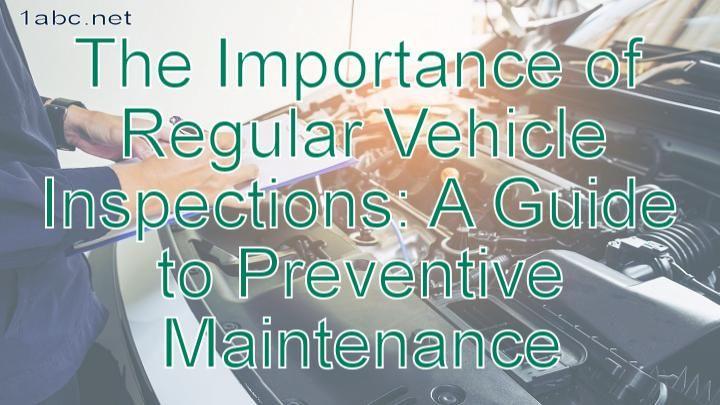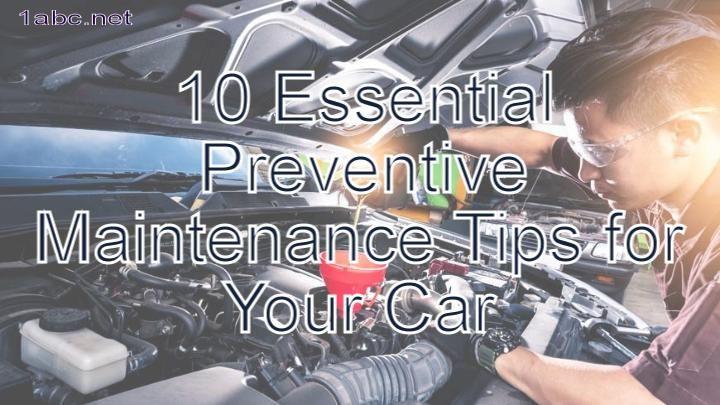Money-Saving Preventive Maintenance Tips for Car Owners

Introduction:
Grab the keys and buckle up! Taking care of your car doesn't have to break the bank. In fact, with a little preventive maintenance, you can save big bucks in the long run. Ready to rev up your savings? Check out these money-saving tips every car owner should know.
I. Regular Oil Changes:
Oil is the lifeblood of your car's engine, and regular oil changes are vital in maintaining its health. Over time, oil breaks down and becomes less effective at lubricating the engine's moving parts. This can lead to increased friction, heat, and wear, which can cause costly repairs down the road. By changing the oil at recommended intervals, you can prevent these issues and potentially save thousands of dollars.
To save money on oil changes, consider finding deals or using coupons. Many auto shops offer discounts or promotions, especially during slower periods. Additionally, you can check online platforms or local classifieds for independent mechanics or DIY oil change events in your area. Just be sure to choose reputable sources to ensure the quality of the oil and filter used.
II. Tire Care:
Proper tire care not only improves fuel efficiency but also extends the life of your tires. Maintaining the correct tire pressure is crucial as underinflated tires can cause increased rolling resistance, leading to decreased fuel economy. On the other hand, overinflated tires may result in poorer handling and uneven wear.
To save money on tire care, make it a habit to check your tire pressure regularly. You can invest in a reliable tire pressure gauge or use the ones available at gas stations. Find the recommended tire pressure for your vehicle in the owner's manual or on the driver's side door jamb. Additionally, ensure that your tires are rotated regularly to promote even wear, which can extend their lifespan. When it's time to replace your tires, shop around for affordable yet reliable options. Keep an eye out for sales or promotions from reputable tire retailers, as they often offer discounts or bundle deals.
III. Fluid Checks:
Checking the various fluids in your car, such as coolant, brake fluid, and transmission fluid, is essential for maintaining the overall health of your vehicle. These fluids play a crucial role in keeping the engine and other components running smoothly.
Regularly checking and maintaining proper fluid levels can prevent expensive repairs down the line. For example, low coolant levels can cause overheating and engine damage, while low brake fluid can compromise your braking system's effectiveness. By taking a few minutes to inspect these fluids, you can identify any potential issues early on and address them before they escalate.
To save money on fluid checks, consider performing them yourself. While it's always a good idea to consult your car's manual for specific instructions, most fluid checks are relatively easy and require minimal tools. Just remember to take proper safety precautions and ensure the engine has cooled down before checking or adding fluids.
IV. Air Filter Maintenance:
Air filters play a vital role in keeping your engine clean and efficient. They prevent dirt, debris, and other contaminants from entering the engine, ensuring optimal performance. Over time, however, air filters can become clogged, reducing airflow and causing decreased fuel economy and engine performance.
To save money on air filter maintenance, make it a habit to inspect your air filter regularly. Most filters are easily accessible and can be inspected visually. If you notice a significant buildup of dirt or debris, it's time to clean or replace the filter. Cleaning the filter is a simple process that involves removing it and gently tapping it to dislodge any loose particles. If the filter is beyond cleaning or damaged, consider purchasing a new filter. Many auto parts stores offer affordable options, and some even have reusable filters that can save you money in the long run.
V. DIY Inspections:
Performing routine vehicle inspections yourself can save you money by catching small issues early before they become major problems. Regularly checking lights, belts, hoses, and battery terminals can help identify any signs of wear or damage, allowing you to address them before they cause more significant issues or breakdowns.
To save money on inspections, take the time to learn how to perform basic checks on your vehicle. You can find step-by-step instructions online or refer to your car's manual for guidance. Remember to prioritize safety by wearing protective gloves and eyewear and ensuring the engine is off and cool before inspecting any components. By doing these inspections yourself, you can potentially save on labor costs and catch small issues that, if left unchecked, could lead to expensive repairs.
Conclusion:
Preventive maintenance is an investment in your vehicle's longevity and your wallet's well-being. By following these money-saving tips, you can keep your car running smoothly and avoid costly repairs. Regular oil changes, tire care, fluid checks, air filter maintenance, and DIY inspections are all simple yet effective ways to save money in the long run.
Remember to share these tips with fellow car enthusiasts and encourage them to prioritize preventive maintenance as well. By spreading the word, we can all enjoy the benefits of a well-maintained vehicle and a healthier bank account. So, buckle up, drive safely, and enjoy the road ahead!
FREQUENTLY ASKED QUESTIONS
What is preventive maintenance for cars?
Preventive maintenance for cars refers to regular servicing and inspections that are performed to prevent potential issues and maintain the optimal performance and lifespan of the vehicle. It typically includes activities such as oil changes, tire rotations, filter replacements, battery checks, fluid top-ups, belt and hose inspections, and overall system checks. By following a preventive maintenance schedule, car owners can identify and address minor problems before they turn into major and costly repairs, ensuring the safety and reliability of their vehicle.
Are there any specific maintenance tasks I should do based on the age of my car?
Yes, there are specific maintenance tasks that you should consider based on the age of your car. Here are some general guidelines:
For cars less than 5 years old:
- Follow the manufacturer's recommended maintenance schedule, which typically includes regular oil changes, fluid checks, and tire rotations.
- Inspect and replace the air filter as needed.
- Keep an eye on the condition of the tires and brake pads, and replace them if they show signs of wear.
- Check and replace windshield wipers if they are not functioning properly.
- Keep the car's exterior clean and waxed to maintain its appearance.
For cars between 5 and 10 years old:
- In addition to the tasks mentioned above, consider more thorough inspections of the vehicle's major components, such as the battery, belts, hoses, and exhaust system.
- Replace the battery if it is showing signs of weakening or is over 5 years old.
- Inspect the suspension and steering components for any signs of wear or damage.
- Consider getting a comprehensive diagnostic check to identify any potential issues that may have developed over time.
- Keep an eye out for any unusual sounds, smells, or vibrations and address them promptly.
For cars over 10 years old:
- In addition to the tasks mentioned above, be more vigilant about checking for signs of aging or wear on key components, such as the engine, transmission, and cooling system.
- Consider more frequent oil changes to help combat engine wear.
- Inspect and replace the spark plugs and ignition system components if necessary.
- Pay close attention to the condition of the vehicle's electrical system, as older vehicles may experience issues with wiring or the alternator.
- Regularly check for and address any rust or corrosion on the car's body and undercarriage.
Remember, these are general guidelines, and it's always a good idea to consult your car's manual or a qualified mechanic for specific recommendations based on your vehicle's make, model, and mileage.




